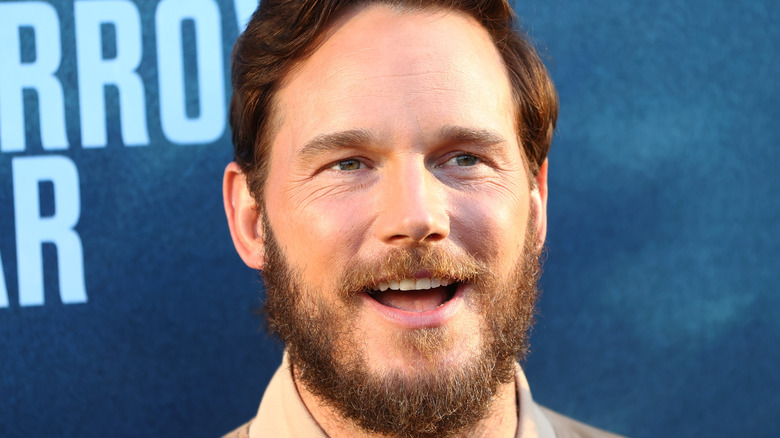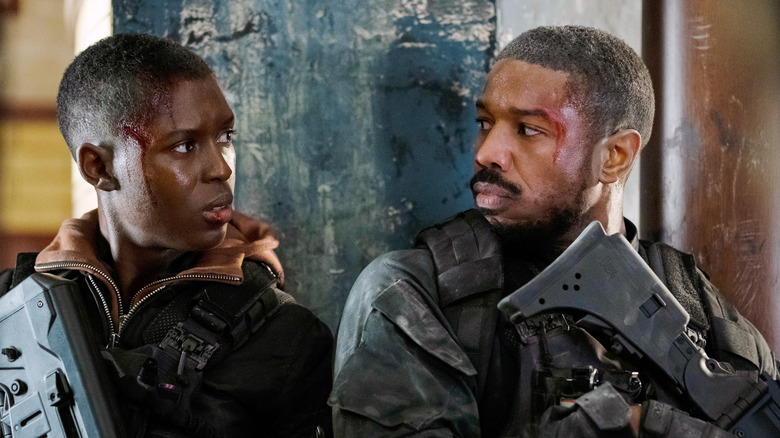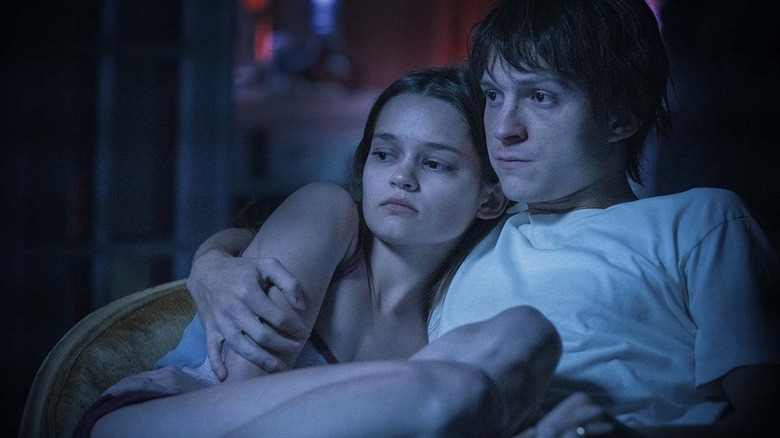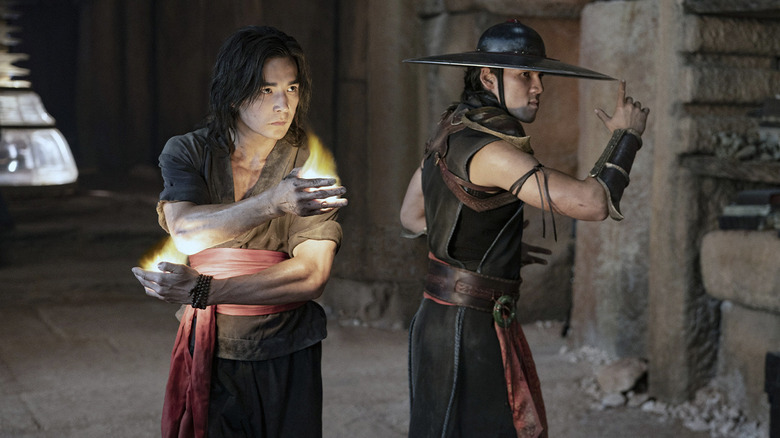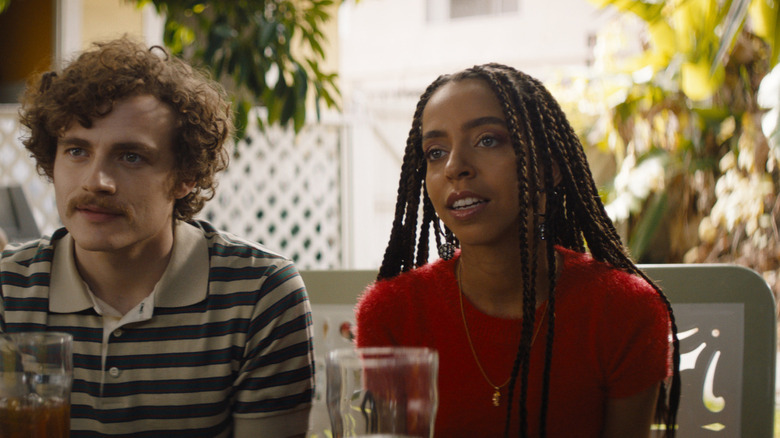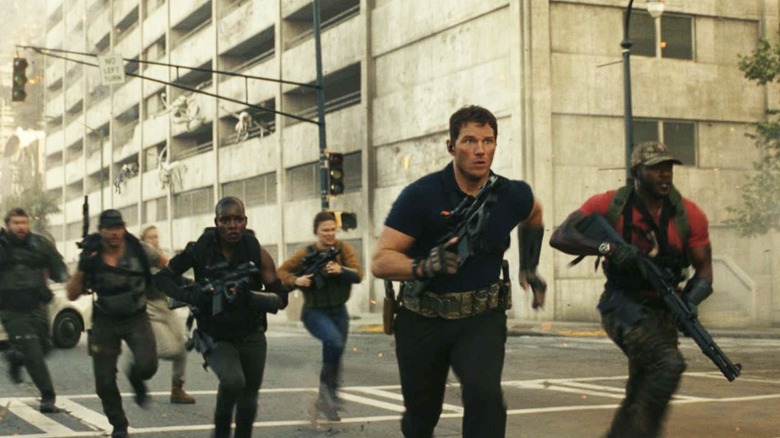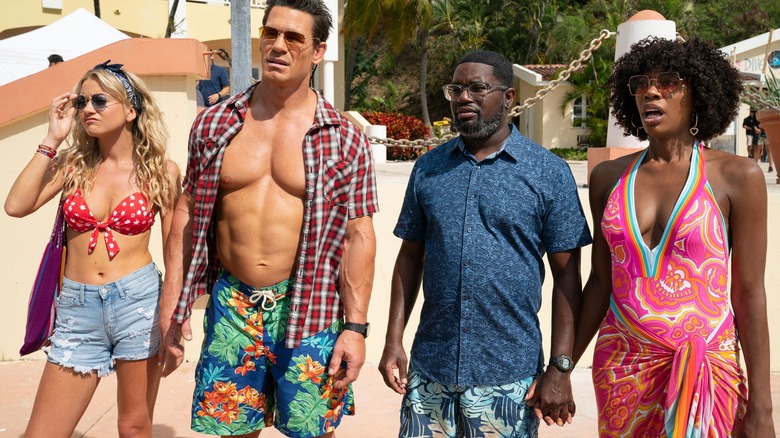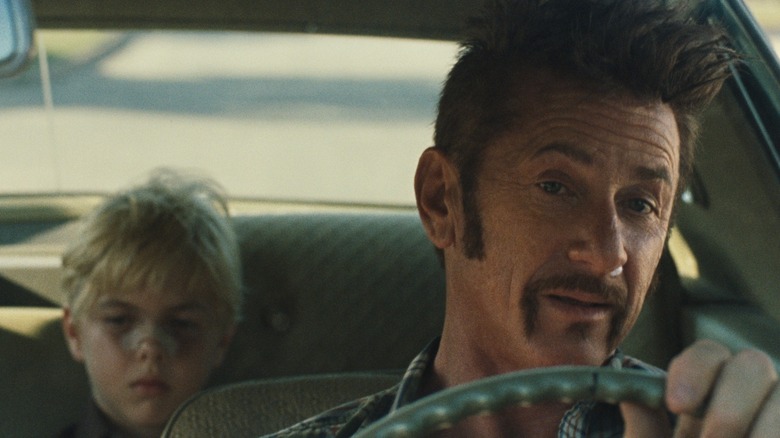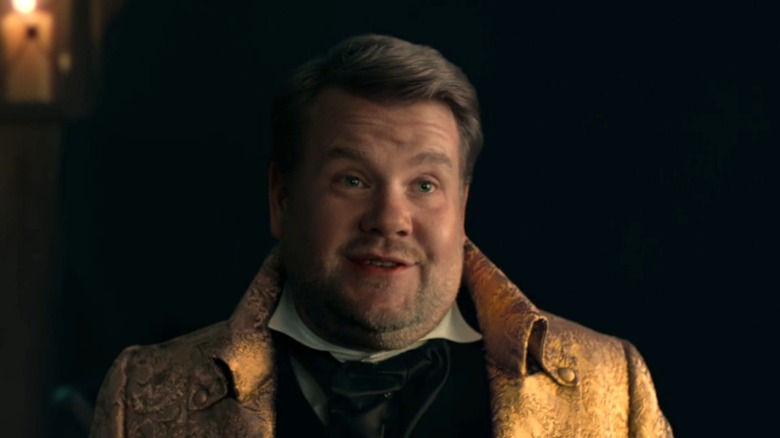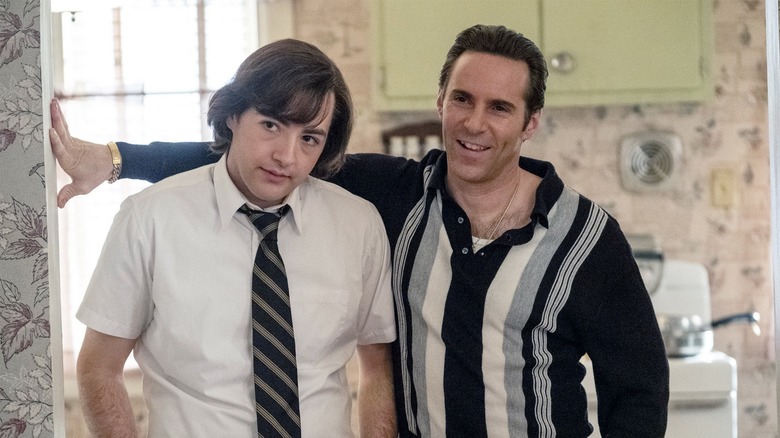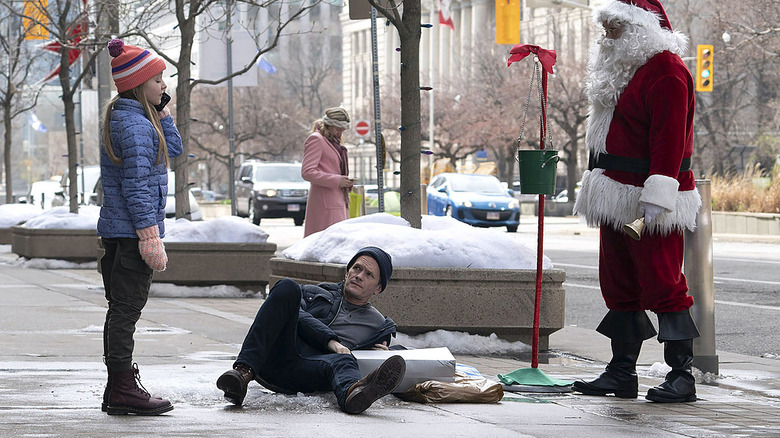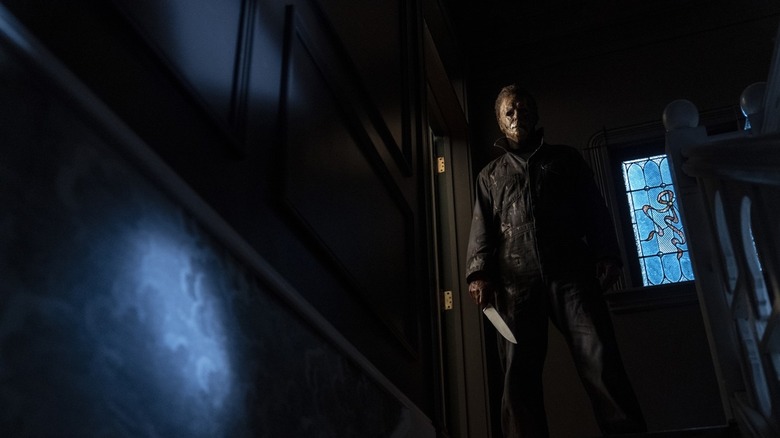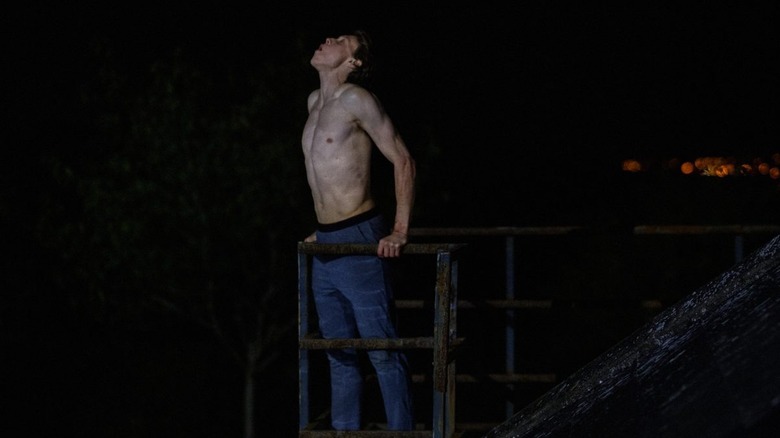The Worst Movie Moments Of 2021
With 2021 coming to a close, it's time to look back on a compelling year of cinema. Throughout these 12 months, filmmakers ranging from Ryusuke Hamaguchi to Julia Ducournau to Jane Campion delivered new pieces of filmmaking that generated widespread acclaim and reminded people about the power of this medium in the wake of all the turbulent chaos brought on by the COVID-19 pandemic. But no year of movies is devoid of duds, and 2021 was no exception. There were several weaker features this year that just didn't work, and these subpar works frequently delivered singular moments that encompassed just why they were so dismal.
Maybe such moments were weighed down by clumsy dialogue that needed way more passes in the screenwriting stage, or perhaps it was a performance that made a moment stand out for all the wrong reasons. Whatever informed their low quality, the worst movie moments of 2021 remind us all of the weakest points of this year's cinema while at the same time allowing us to appreciate the vastly superior works 2021 did deliver.
A pivotal confrontation in Without Remorse
One of the most delightful things a movie can do is let its secret villain accidentally let slip a piece of information that reveals their malicious nature. Such a moment is inevitably be followed up by one of the good guys remarking, "I didn't mention [incriminating information]." Movies like "Minority Report" and "State of Play" featured great iterations of this moment, which are just so playful and excite the viewer with the promise of a charlatan getting exposed. It's a testament to how badly made "Without Remorse" is that it manages to bungle this kind of moment, which should be a slam-dunk in terms of eliciting audience enthusiasm.
The iteration of this hallmark in "Without Remorse" comes when John Kelly (Michael B. Jordan) confronts secret villain Secretary Clay (Guy Pearce) in a bathroom. When talking to the secretary of defense, Kelly brings up the recent death of an important figure in the intelligence field. After remarking on this demise, Kelly surmises that Clay is evil because he wasn't surprised enough. From here, Kelly kidnaps Clay and forces him to confess his misdeeds. It's staggering how miscalculated this moment is, as it doesn't have Clay confess something he couldn't know — Kelly's suspicion of Clay is clinched just by his off-the-cuff response to someone's death! "Without Remorse" constantly wastes the good material at its fingertips, including Jordan's charisma, and this clumsy moment is no exception.
Tom Holland tries to break into a safe in Cherry
"Cherry," the big dramatic filmmaking debut from Anthony and Joe Russo, is constantly aiming to be a provocative movie that shocks as often as it leaves you thinking. Unfortunately, moviegoers left the theater astonished that the pair's Marvel movies had way more discernibly authentic human beings than this grounded drama. Part of the issue was the awkward tonal shifts in the film, which kept jumping from comedy to crime thriller to romantic drama, without ever making the individual pieces effective enough to justify the disjointed structure.
This was especially apparent in a montage sequence depicting Tom Holland's protagonist, girlfriend (Ciara Bravo), and best friend trying to crack open a safe containing drugs they desperately want. To reflect how deeply the trio has become hooked by the tendrils of addiction, a comedic montage shows various ways they try to get the safe open. The wacky tone of the segment just feels strange to employ when talking about people experiencing addiction. Strangely, the gifts the Russo's had for directing comedy on sitcoms like "Arrested Development" are nowhere to be found, and the editing and direction in "Cherry" hinder the impact of the dark comedy visual gags. Rather than lending further insight into the main characters of "Cherry," the montage ends up being a microcosm of the tonal and filmmaking problems that sank this directorial effort.
If you or anyone you know is struggling with addiction issues, help is available. Visit the Substance Abuse and Mental Health Services Administration website or contact SAMHSA's National Helpline at 1-800-662-HELP (4357).
The awkward gnome payoff in Mortal Kombat
Early on in "Mortal Kombat," Kano (Josh Lawson) makes a crack about a heretofore unseen garden gnome owned by Sonya Blade (Jessica McNamee). The camera then cuts to a close-up shot of the garden gnome, providing a bow to an extended gag that doesn't work at all from either a comedic or a visual standpoint. If you thought that was bad, though, just wait — "Mortal Kombat" opts to create Chekhov's garden gnome by having this outdoor decoration come back into play in Kano and Sonya's final fight.
In this skirmish, Kano appears to be moments away from vanquishing Sonya, but the latter fighter manages to get the upper hand by grabbing the garden gnome and plunging it into Kano's eye. It's a meek closing move to this battle and one that deprives Sonya of finishing off Kano in a manner that would be more specific to her personality. Worst of all, it's also a reflection of "Mortal Kombat" mistakenly believing audiences would love the original garden gnome gag enough to be fist-pumping to see its return in the action-packed climax. If a garden gnome isn't funny the first time, it won't be entertaining a second time.
The barrage of tragedy at the end of Mark, Mary & Some Other People
"Mark, Mary & Some Other People" is a 2021 indie movie by director Hannah Marks about a couple that decides to have a polyamorous relationship. The ensuing story has its share of inspired moments, including a scene where the titular Mark (Ben Rosenfield) and Mary (Hayley Law) decide to have a threesome with another woman. It's a prospect that Mark initially finds enticing, only for the actual scenario to involve Mary and the woman becoming physically intimate while Mark is left on the sidelines. Unfortunately, such subversive tendencies are eschewed in the third act, which sees a comedy that previously championed challenging sexual norms succumbing to familiar narrative tropes.
In the third act, Mary — a queer woman who was always the one most gung-ho about seeing other people between herself and Mark — gets pregnant. This development is one that eventually culminates in a barrage of tragedy befalling Mary, including a miscarriage. Whether intentional or not on the part of Marks, this development can't help but come across as a new form of the classic Hollywood staple of "punishing" sexually active women with harrowing tragedies. Of course, Mary would have to experience something this devastating given that she enjoyed sex and was queer to boot. This uncomfortable moment at the end of "Mark, Mary, & Some Other People" makes the more inspired moments of the production feel like they came from a different movie entirely.
The going rogue moment in The Tomorrow War
At the start of the third act of "The Tomorrow War," the main characters have figured out where the aliens who will wreak havoc on Earth's population in the future are coming from — they're in hibernation in the arctic. If they don't act now, humanity as we know it will be erased. With time on the line, "The Tomorrow War" proceeds to ... engage in an extended awkward moment explaining why the main characters don't go to the various world governments for help. Instead of explaining the decision away in a line or two of dialogue, it's mined for an extended sequence that drags on forever.
With a 140-plus minute runtime, "The Tomorrow War" is already an excruciatingly overlong affair. There's plenty that could be cut, but especially this awkward moment, which feels like it's answering a question nobody who watches a film about Andy Dwyer fighting aliens from the future would care about. Focusing more on characters and excitement would have helped this movie immensely — or at least spared audiences this clumsy moment.
The implied sexual assault in Vacation Friends
After spending a wild night with Ron (John Cena) and Kyla (Meredith Hagner), "Vacation Friends" protagonist Marcus (Lil Rel Howery) passes out on a couch and tries to get some shut-eye. While snoozing, he briefly wakes up and sees Kyla grinding on top of him before he returns to his drug- and drink-induced slumber. It's supposed to look like she's having sex with an unconscious Marcus — an alarmingly grotesque thing to throw into the middle of an R-rated comedy with the lighthearted ambiance and stale writing of a network sitcom.
Even worse, "Vacation Friends" keeps reminding viewers that this happened through a recurring subplot where Marcus is convinced he's the father of the newly-pregnant Kyla's child. Most concerningly, this is played off as a wacky misunderstanding subplot, not a byproduct of potential rape. Watching generic comedic hijinks ensure with these characters on a golf course and in a fox hunt while this dark cloud lingers over everything makes for truly uncomfortable viewing. Thankfully, in the third act, Ron and Kyla make it apparent that Kyla's child is not Marcus', while Marcus' wife, Emily (Yvonne Orji), delivers an off-hand comment somewhat clarifying that Kyla never had sex with Ron. But it's still strange that such an uncomfortable moment not only happened in "Vacation Friends," but it kept factoring into this forgettable comedy's plot.
If you or anyone you know has been a victim of sexual assault, help is available. Visit the Rape, Abuse & Incest National Network website or contact RAINN's National Helpline at 1-800-656-HOPE (4673).
The opening flashbacks in Flag Day
Sean Penn's 2021 directorial effort "Flag Day" — a movie already destined for existence at the bottom of discount DVD bins at Wal-Mart's everywhere — doesn't waste time in establishing what a mess it's going to be. This movie opens with flashbacks to the childhood of the main character Jennifer Vogel (played as a grown-up by Dylan Penn) as she's connecting with her dad, John (Sean Penn). As this footage goes on, narration from an older Jennifer comments on how her father was like Peter Pan, and "the most ill-advised decision seems like the result of careful planning."
From this opening scene, "Flag Day" delivers didactic dialogue and on-the-nose imagery that the rest of the film keeps on delivering. There's nothing unique about the relationship between Jennifer and father John Vogel (Sean Penn) conveyed in these critical opening moments, and there's a similarly derivative nature to the Terrence Malick-esque qualities in Sean Penn's filmmaking. Of course, the actor-turned-director only channels the most surface-level details of Malick's camerawork here, which at least makes it consistent with the shallow approach "Flag Day" has to its primary characters. Worst of all, the dialogue in this narration is like nails on a chalkboard and acts as a precursor to all the other clumsy lines that the rest of the film delivers. There are countless problems with "Flag Day," but some of its biggest issues are already apparent in a shockingly uncreative opening sequence.
James Corden's head on a CGI mouse in Cinderella
Every version of "Cinderella" features a variation of the scene where the titular princess has to rush home after the clock strikes midnight. With it being only a matter of time before she returns to her status as an ordinary person, this staple of the narrative provides a reliable source of tension in the story. But only Kay Cannon's take on "Cinderella" features a uniquely terrifying moment chronicling one of the mice-turned-horsemen returning to their original form.
Specifically, this iteration of the tale features a moment where the rodent played by James Corden is in the middle of his transformation, resulting in the visual of Corden's live-action head being placed on top of a CGI mouse's body. Directors like Ari Aster, Tobe Hooper, and Pier Paolo Pasolini only wish they could've come up with such a disturbing image. The visual is made all the more unnerving by how it's accompanied by screams from Corden and the other cast members in the scene. Watched out of context, you'd assume this is from a horror version of "Cinderella," not an attempt to make a #GirlBoss family movie take on the story. This iteration of the classic fairy tale was not a piece of quality filmmaking, but you can't say it didn't deliver something you'd never seen in another "Cinderella" movie.
The clumsy ending of The Many Saints of Newark
Throughout its runtime, "The Many Saints of Newark" struggles mightily with juggling its aspirations of working as a standalone crime movie and functioning as the ultimate haven for "Sopranos" fan service. For instance, talented actors like Billy Magnussen and John Magaro have their talents smothered as they waltz around in what appears to be cosplay so that they can mimic older versions of characters like Paulie Walnuts and Silvio Dante, respectively. The worst example of this, though, comes in the final scene of "The Many Saints of Newark," when any attempt at creating something unique and individualistic comes shattering down.
As Tony Soprano (Michael Gandolfini) stands over the open casket of Dickie Moltisanti (Alessandro Nivola), a fantasy scene emerges where Moltisanti raises his finger to Soprano. The future crime kingpin extends out his finger, uniting it with Moltisanti, indicating he'll continue the man's brutal criminal streak. It's a goofy, on-the-nose image far removed from the thoughtful visuals the original "Sopranos" show employed, but it's made even worse by the sudden use of the program's theme song, "Woke Up This Morning." This Alabama 3 tune may work in giving a jolt of nostalgia to "Sopranos" fans, but it doesn't fit at all in the 1970s aesthetic of "The Many Saints of Newark." With these ingredients consuming the screen, "The Many Saints of Newark" ends on a note so underwhelming, you'll wish you'd just watched some episodes of "The Sopranos" instead.
The detour into father/son schmaltz in 8-Bit Christmas
For much of its runtime, "8-Bit Christmas" is content to just be another piece of shallow 1980s nostalgia, with the unique quality of also being a commercial for retro Nintendo game consoles. However, this is supposed to be a Christmas-themed comedy, so there eventually have to be moments that tug at your heartstrings. In this case, the pathos comes at the very end, when the story decides it wants to be a father/son parable about Jake Doyle (Winslow Fegley) and his dad John Doyle (Steve Zahn). This emphasis gets spurred on by John giving his son an elaborate treehouse for Christmas instead of the Nintendo Entertainment System he originally wanted. The care his dad put into the treehouse makes the young Doyle forget all about video games and treasure the greatest gift of all: family.
The sudden introduction of this story element falls flat solely because of the lack of build-up to this relationship. Jake's only had a handful of scenes with his dad up to this point, and none of them suggested their dynamic would become the crux of "8-Bit Christmas." The movie commits so much to wringing this relationship for poignancy that there are scenes with an old Jake Doyle (Neil Patrick Harris) being sad over his dad being dead. The sudden detour into this emotional territory doesn't feel earned and ends an underwhelming comedy on a weak note.
The attempt at social commentary in Halloween Kills
Horror cinema has always been used to talk about weighty issues plaguing the real world. Dating back to the days of "Night of the Living Dead" or "The Texas Chainsaw Massacre," grisly carnage on the big screen can be an effective tool to make sense of chilling atrocities in reality. Of course, just because sociopolitical undercurrents have often been a staple of this genre doesn't mean every attempt at probing weighty issues in horror filmmaking has gone well. Case in point: "Halloween Kills," which tries to be an exposé on the consequences of mob justice but ends up just being confused and muddled.
The nadir of this theme comes after the residents of Haddonfield mistake an escaped mental hospital patient for Michael Myers, which leads this man to jump to his death to escape their wrath. As everyone gathers around the corpse and realizes their mistake, an onlooking cop remarks that this mob has become the real monster in the scenario. It's such a ham-fisted piece of dialogue that rams home the intended point, while the abrupt conclusion to this detour just makes it superfluous to the overlong runtime of "Halloween Kills." Horror movies — including "Halloween" entries — have often effectively said thoughtful things, but "Halloween Kills" is certainly not an example of this phenomenon.
Aidan Gillen's animal impressions in Wolf
"Wolf" is a confusing movie that's neither as strange nor as thoughtful as it should, given that its premise concerns teenagers with species dysphoria being tortured to "cure" their condition. Initially, one reliable element of the film is the performance of Aidan Gillen as the camp's sadistic leader known only as The Zookeeper. There is a discernibly chilling quality to Gillen's work portraying an abusive man who also believes that he's like a surrogate father figure to these wayward teens.
Unfortunately, Gillen's performance goes off the rails in one of the more confounding moments of "Wolf," where a swarm of rebellious activities from the various attendees is interrupted by the sudden arrival of The Zookeeper. He comes into the room and begins brutally insulting each child and doing moving impressions of the noises associated with whatever animals they identify as. It goes on for far too long and feels like an acting exercise that got out of hand rather than something organic to the character of The Zookeeper. It also feels too overtly malicious, as what made The Zookeeper initially interesting was his nonchalant nature. The quiet suggestion that evil could manifest anywhere, even in people who thought they were doing right, was haunting. But this over-the-top moment undercut that severely and reinforced how "Wolf" kept barking up the wrong tree creatively.
